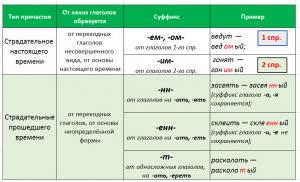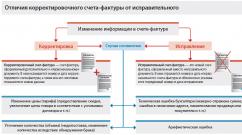Epistle to the Galatians. The Bible about eternal life In time we will reap if we do not give up
Discourse ABOUT GOOD, about the corruption of the flesh and the eternal life of the spirit, about despondency, about activity and virtue.
Today we will pay attention to one word of the Apostle Paul, which he said to the Galatians. In Galatians 6 he says, “Whatever a man sows, this will he also reap: whoever sows to his flesh will from the flesh reap corruption, and whoever sows to the Spirit will from the Spirit reap eternal life.” And further: “Let us not become weary in doing good, for in due time we will reap if we do not give up. So, while we have time, let us do good to everyone, and especially to those who are of our own in the faith.” So, “let us not grow weary in doing good”—why is this said? Because he who does good loses heart. Test yourself with these words. If you think that the one who does good is as bright as an angel, and he does good to everyone, as if pouring it out of his sleeves, like in a fairy tale, then you do not know the taste of goodness. Good is sweet on the lips and bitter in the belly. A person who does good suffers attacks from demons. God strengthens us in our weakness, but a person often sees black ingratitude in response to the fact that he has done good or feels persecuted by enemies, as King David ran from enemies all his life. He ran all his life until old age from enemies, among whom were his own children. He talked to God word of mouth, and his own children wanted to cut off his head. He ran from them. Sometimes behind them, sometimes away from them. And a person who does good really very quickly learns from experience how difficult it is, how incomprehensible, thankless, and how necessary it is. Therefore, the Apostle Paul considers it necessary to say that we do good and do not lose heart, because in due time we will reap if we do not give up. There is a certain gap, a certain time period between sowing and harvesting. If I sowed it and it immediately grew, then somehow our life would have turned out differently. And since we sow today, and in a year, in 15, 20, 30 years we reap, therefore the sons of men are in no hurry to correct themselves in regard to evil. They forget about the cause-and-effect relationships between the evil done long ago and today's trouble. He thinks: - Why do I need this? And if his moral memory were clear, he would know that he had caused so much mischief in his life that it was high time to reap the benefits. And if someone suffers punishment from the Lord, remember a little further about your life yesterday and understand that there are some roots from which they received evil tips today. There is a serious time division between sowing and harvest; this must be felt and understood. And “Let us not become weary in doing good, for in due season we will reap if we do not give up.”
Any amount donated to you is a significant contribution; it is, first of all, moral support. And for technical support broadcasting the program requires 50 thousand rubles monthly.
About various special discoveries of Christian love (1–10). Conclusion to the message (11–18)
Gal.6:1-10. When converting a sinner to the true path, one must act in a spirit of meekness. You should also take care of your neighbors in their needs and failures, being forgiving of their shortcomings, in view of the fact that each of us also has our own sins. The moral section ends with a new call to do good to people.
Gal.6:1. Brethren! If a person falls into any sin, you who are spiritual correct him in the spirit of meekness, each one watching himself, so as not to be tempted.
“He will fall” - accidentally, unexpectedly for himself, out of enthusiasm from the outside (προληφθῆ - more precisely: “will be captured”). – “Spiritual” – οι πνευματικοί, i.e. those Christians in whom the Holy Spirit most manifested His power, in whom He became the guiding principle of life, while among the mass of Christians the influence of the flesh is still strong (cf. 1 Cor. 3 :1-3). These are the people whom Ap. calls them “perfect” (1 Cor. IÏ6; Phil. IIÏ15), “strong” (Rom. 15:1). - “So as not to be tempted,” that is, so as not to fall into sin. For a “spiritual” person, a brother’s transgression should, therefore, serve as a warning, remind him of his own weakness, and this memory will force him to treat the sinner more gently...
Gal.6:2. Bear one another's burdens, and in this way fulfill the law of Christ.
Not only the brother’s sin, but also any heaviness (“burden”) that is felt by our brothers should also be felt by us, as if oppressing ourselves. Therefore, we must help our brother bear his burden, by which we must understand everything that depresses a person, which he cannot cope with on his own - both his spiritual and material adversities. Such a broad understanding of the word “burdens” is also encouraged by the conclusion of the verse: “in this way fulfill the law of Christ” or Christ’s commandment about love, which actually consists of the essence of the law of Christ (Matthew 22 et seq., John 13:34). Fulfillment of the law of Christ. and now he already sees from the side of the Galatians, but this fulfillment is still imperfect. It will be perfect only with time (αναπληρώσετε - from αναπληροῦν perform perfectly, in contrast to πληρουρν simply perform. In the Galatians, it is still impossible to state αναπληροῦν, but only πληροῦν). This perfect fulfillment of the law of Christ is only possible when the Galatians always help the brothers to bear their “burdens.”
Gal.6:3. For whoever thinks himself to be something when he is nothing deceives himself.
Ap. called on Christians to bear "one another's" burdens. With his last words, he made it clear that everyone has burdens, burdens, awareness of their shortcomings and these very shortcomings. But there are people who think too much about themselves (this is indicated by the expression “counting oneself as something” cf. 1 Cor. 3:18, 10:12, 14 and especially 1 Cor. 8:2). A similar person, since he is in fact nothing, he only deceives himself, completely confuses himself in his thoughts (φρεναπατᾶ), and he is no longer able to properly treat his dejected brother, to serve him.
Gal.6:4. Let each one test his own work, and then he will have praise only in himself, and not in another,
Instead of enjoying his imaginary virtues, a Christian should rather examine his behavior (“his work” or doing). - “Then he will have praise...” The translation is inaccurate. More precisely: “then he will have reason to boast only in relation to himself, and not in relation to another.” Ap's thought. like this. We often praise ourselves only because we see the unpraiseworthy actions of others. Meanwhile, assessing yourself from such a point of view is wrong. We need to test ourselves, find out all our strengths and abilities and think about whether we have used these abilities as we should. Then it will turn out that we have nothing to boast about, that we should rather ask God for forgiveness for having neglected His gifts.
Gal.6:5. for each one will bear his own burden.
Here is the basis or motivation for self-examination. We need to pay serious attention to our behavior, because each of us will carry the results of our earthly work into another life, before the throne of the Eternal Judge (cf. Rev. 14:13; 2 Cor. 5:10, Matt. 5 et seq.). At the same time, Ap. to denote the concept of “burden” he no longer takes the same word as he used in Gal.6:2. There is the word τά βάρη, which means every burden, no matter where it comes from and no matter how long it has to be borne. The word φορτίον is placed here, which means the weight that someone loads on themselves or allows to be placed on themselves in order to carry it to a certain goal. Actions that are committed by a person himself here, in earthly life, are such a burden that he himself, and not others, must bear throughout life and beyond (for example, for a depraved life a person often pays with a disease that no one can share with him can't)...
Gal.6:6. Instructed by the word, share every good thing with the one who instructs.
Already at that time there were among Christians special teachers of the faith for people who were little aware of it (cf. Acts 13:1; 1 Cor. 12:26; Eph. 4:11). He who receives instruction in the word is obliged to reward the teacher with all good things (“every good thing”), that is, with earthly gifts, material goods (cf. 1 Cor. 9:11; Rom. 15:27. Teaching of the 12 Apostles XIIÏ2 ; XV et seq.).
Gal.6:7. Do not be deceived: God cannot be mocked. Whatever a man sows, that he will also reap:
The Judaizers, apparently, rebelled quite a lot against this position of the Apostle and armed the Galatians, allowing themselves to mock (μυκτηρίζεσθαι - in Russian, not exactly: “quarrel” - in the expression: “God cannot be mocked”). Instead of talking about himself, Ap. says about God that one cannot mock Him, as the Judaizers did, who actually mocked Paul. Thus, the Apostle wants to say that the order that exists in the Church is the will of God Himself. God also makes sure that man always reaps what he sows; here on earth, from a certain seed the same seed is produced.
Gal.6:8. He who sows to his flesh will reap corruption from the flesh, but he who sows to the Spirit will from the Spirit reap eternal life.
Now Ap. speaks not of what is sown, but of the soil into which the seeds are thrown. The difference in the harvest depends on the difference in soil. Whoever throws seeds “into the flesh,” that is, cares about the flesh, will receive only decay from this soil. On the contrary, whoever sows “to the spirit,” on the soil of the spirit, will receive eternal life from the spirit, so general rule, given at the end of Gal.6:7, also applies here. Ap. He wants to say by this that whoever uses his property only to improve his own well-being (Rom. 13:14), who indifferently passes by the needy brothers, will receive nothing except what the soil on which he uses his property can provide, i.e. . i.e. nothing but corruption (cf. Col. 2:22; 2 Pet. 1:4, 2:12, 19). The one who, on the contrary, uses his earthly acquisitions for the good of society, and specifically for the spiritual good, will receive eternal life - of course, not from money, but from the Spirit, to whose service he has given himself (cf. Matt. 6:19-24, 19:21).
Gal.6:9. Let us not become weary in doing good, for in due season we will reap if we do not give up.
“Let us not lose heart” - more precisely: “let us not abandon him.” A person sometimes has to get tired under the burden of the duty he has assumed to do good to his neighbors. But he must quickly shake off the feeling of such fatigue.
Gal.6:10. So, as long as we have time, let us do good to everyone, and especially to those who belong to our faith.
A Christian must do good to all people, but first of all to those who are related to him in faith.
Gal.6:11-18. At the conclusion of the message of Ap. Once again he utters a bitter complaint against his opponents - the Judaizers - and then declares that for him personally the cross of Christ is the only pride of his life.
Gal.6:11. You see how much I wrote to you with my own hand.
The apostle wanted the Galatians to imagine his face as clearly as possible (cf. Gal. 4 and Gal. 5:2). Therefore, contrary to his custom of using the services of scribes to whom he dictated messages when writing messages, he now took up the pen himself and wrote a rather large message and, moreover, in very large letters (“how many” - more precisely: “what large letters” πηλίκοις γράμμασιν ). Why he wrote in “large letters” is unknown. Perhaps he could not see well and his eyes hurt, so he could not write small, or perhaps in order to give special importance to this message.
Gal.6:12. Those who want to boast in the flesh force you to be circumcised only so that you will not be persecuted because of the cross of Christ,
Gal.6:13. For even those who are circumcised do not keep the law, but they want you to be circumcised, that they may boast in your flesh.
Paul cannot forget that while he is away from the Galatians, they are being seduced by the Judaizers; to warn his readers against them, he says here that these false teachers, who base all their dignity on their carnal Jewish advantages (Rom. 2:28; Eph. 2:11; Phil. 3 et seq.), are of no importance for moral and religious life, the sphere of which is the spirit, they force the Galatians to be circumcised in those forms in order to free themselves from the persecution of unbelieving Jews, for whom the cross of Christ was a temptation (Gal. 5:11; 1 Cor. 1:23). The law itself, its internal content, does not matter to such people: they do not comply with its numerous instructions. - “Cutting people.” Why Ap. uses the present tense about Jews? After all, they were already circumcised a long time ago (cf. Gal. 5:12)? He means by this that circumcision was for them something like a dogma, which they constantly preached: they were people of circumcision (Gal. 2:12). - “Boasting in your flesh,” that is, having circumcised you, they will refer to this as proof of their devotion to the law of Moses. And this could be useful to them when the unbelieving Jews began to reproach them for believing in Christ. These people, so to speak, wanted to insure themselves against persecution for their faith in Christ by taking out a patent for “reliability.”
Gal.6:14. But I do not want to boast, except in the cross of our Lord Jesus Christ, by which the world has been crucified to me, and I to the world.
Gal.6:15. For in Christ Jesus neither circumcision nor uncircumcision means anything, but a new creation.
Ap. does not belong to the category of such people seeking the favor of the world. - “But I do not desire” - more precisely: “let it not be with me that”... While they are seeking glory for themselves, trying to put the stamp of Judaism on a larger number of pagans, the Apostle considers the cross of Christ, which in at the same time, there is also his cross: he himself experienced and felt what Christ experienced and suffered on the cross (Gal. 2:19). And just as for Christ His relation to the narrow boundaries of the Jewish nationality ceased with death on the cross, so for Paul, who participates in this death. Through the crucified Jesus, peace came to Paul and Paul died to the world. What Ap. really died to the world - this is absolutely true, because now, at the present time, neither circumcision nor uncircumcision matters: there are only new “creatures” created in Christ for a new, eternal life (cf. 2 Cor. V: 17).
Gal.6:16. To those who act according to this rule, peace and mercy be upon them, and on the Israel of God.
To those who hold the same way of thinking as the Apostle, he sends his blessing. - “And to the Israel of God,” that is, true Israel, which, indeed, can be called the people of God. By this “Israel” it is most natural to understand Christians from Judea, in whom Israel continues its life as the people of God (Rom. 11: 1-8, 9: 27-29; Phil. 3 cf. interpretation by Ephraim the Syrian, Ambrosiastes, who understood this expression).
Gal.6:17. However, let no one burden me, for I bear the marks of the Lord Jesus on my body.
“However” is more correct: “from the rest” of Israel (τοῦ λοιποῦ) “no one should prepare labor or burden for me.” Ap. does not want the rest of the Israelis, who have recoiled from God, to interfere in his affairs and put obstacles in his way. – “The Ulcers of the Lord Jesus” – according to Tischendorf and other new editions: “The Ulcers of Jesus.” By “ulcers” (τα στίγματα) one must understand the actual marks on the body made by some kind of cutting instrument or hot iron. According to the ancient general opinion of interpreters, Ap. This is what he calls the scars remaining on his body from the wounds inflicted on him during the persecution of the Jews (2 Cor. 11:24, 25). He calls them “the stripes of Jesus” because he imagines Christ as the God-man Jesus, being scourged and beaten by soldiers at the trial of Pilate (Matt. 27:26, 30; John 19:1, 3), and because he considers his own suffering as participation in suffering - Jesus (Phil. 3:10: Col. 1:24)... “If anyone saw a warrior out of ranks bloodied and covered with countless wounds, would he begin to accuse him of cowardice and betrayal when Does this one wear proof of his courage on his very body? “The same way,” he says, “should be judged about me... My wounds provide evidence stronger than words and more extensive than this message” (Chrysostom).
Gal.6:18. The grace of our Lord Jesus Christ be with your spirit, brothers. Amen.
Ap. in the message he said a lot of unpleasant things for readers. As if covering with his love all their misdeeds and wanting to show that he is not angry with them, he sends them the same greeting that he usually adds in his messages and calls them “brothers.”
“Let us not become weary in doing good; for in due season we will reap, if we do not give up. So, while we have time, let us do good to everyone, and especially to those who are of our own in the faith.” The topic of conversation changes somewhat and moves from personal holiness to good deeds, helping other people, participation in philanthropic activities of the church or society. But the Apostle considers all this with the help of a metaphor about sowing and reaping.
Of course, good Christian deeds require some additional motivation. Paul acknowledges this as he encourages his readers to “not lose heart” and “not to faint” (cf. 2 Thess. 3:13). Active Christian ministry This is hard, demanding work. We are tempted to give in to disappointment, to relax, even to give up completely.
Therefore, the Apostle gives us this motivation, he says that doing good is the same as sowing a seed. If we sow unceasingly, “in due season we will reap, if we do not faint.” If a peasant, tired of sowing, leaves the field only half sown, then he will reap only half of the possible harvest. Exactly the same with good deeds. If we want to get a harvest, we need to finish sowing and wait patiently, just as a farmer “waits for the precious fruit of the ground and waits long for it...” (James 5:7). As John Brown puts it, “Christians often act like children when it comes to the harvest. They want to sow and reap in one day.”
If sowing means good deeds for people, then what will the harvest be like? Paul does not say this, leaving us to guess for ourselves. But patiently doing good deeds in the church or in the community will always bring good results. It can bring comfort, relief or help to those in need. This can lead the sinner to repentance and salvation; Jesus Himself spoke of His work as sowing and reaping (Matt. 9:37; John 4:35–38). Perhaps the moral destruction of society will be stopped (this is the function of the “salt of the earth”) and society will even turn into a more pleasant and healthy place to live. Maybe a person will learn to respect the beautiful, the good and the true, especially now when norms are changing so rapidly. This will bring good to the one who does good - not salvation (for this is a gift of God that cannot be earned), but some kind of reward in heaven for faithful service; perhaps this reward will be even more responsible service.
“Therefore [Paul continues in verse 10, since good seed sown brings forth a good harvest] while we have time [and we have plenty of time and opportunity in mortal life], let us do good to everyone, but especially to those who are of the family of the faith.” Those who are our own by faith are fellow believers, “who have received equally precious faith with us” (2 Pet. 1:1), that is, our brothers and sisters in God's family. As they say, “charity begins at home,” in relation to relatives, who have the first right to demand our devotion, although Christian charity does not end there. Jesus said that we need to love and serve our enemies, not just our friends. Thus, "consistency in good work" (Rom. 2:7) is inherent in the true Christian, so inherent that on the Day of Judgment it will be accepted as evidence of saving faith.
Conclusion
We looked at three areas Christian life, to which Paul applies his inexorable principle: “Whatever a man sows, that will he also reap.” In the first, the seed is the Word of God, which teachers sow in the minds and hearts of the congregation of believers. In the second, this seed is our own thoughts and deeds, sown either into the flesh or into the spirit. In the third, the seeds are good deeds sown in the lives of people around us.
And in each case, although the seeds and soil are different, the sowing is followed by the harvest. The teacher who sows the Word of God will reap sustenance; this is God's plan. The sinner who sows to the flesh will reap corruption. The believer who sows to the Spirit will reap eternal life, a fellowship with God that will continually deepen. A Christian philanthropist who sows good works in the community will reap good results in the lives of those he serves, as well as rewards in eternity.
In neither case, nor in the other, nor in the third case, “God cannot be mocked.” The same principle always applies everywhere. And since God cannot be deceived, we remain fools by trying to deceive ourselves! This law cannot be ignored or resisted; we must accept it and live in accordance with it. It is necessary that common sense allows this law to operate in our lives. “Whatever a man sows, that will he also reap.” We will certainly reap what we sow. Therefore, if we want a good harvest, we must sow and continue to sow good seed. Then, in due time, we will reap the harvest.
6:11–18.
THE ESSENCE OF THE CHRISTIAN RELIGION
11 You see how much I have written to you with my own hand.
12 Those who desire to boast in the flesh force you to be circumcised only so that you will not be persecuted for the cross of Christ;
1) For even those who are circumcised do not keep the law, but they want you to be circumcised, that they may boast in your flesh.
14 But I do not want to boast except in the cross of our Lord Jesus Christ, by which the world has been crucified to me, and I to the world.
15 For in Christ Jesus neither circumcision nor uncircumcision means anything, but a new birth.
16 To those who walk according to this rule, peace and mercy be upon them, and on the Israel of God.
17 However, let no one burden me, for I bear the marks of our Lord Jesus Christ on my body.
18 The grace of our Lord Jesus Christ be with your spirit, brothers. Amen.
So Paul has come to the end of the letter. Hitherto he had dictated it, but now, as was his custom, he took the pen from his secretary to add a postscript in his own hand. Usually he simply added his signature to authenticate the message (see 2 Thess. 3:17). Sometimes he added a final instruction or blessing. But this time he writes a few final phrases with his own hand.
Verse 11: “See how much I have written to you with my own hand.” Various assumptions have been made about these "big letters". Perhaps Paul had in mind the “clumsy, sloppy letters” of a person unaccustomed to writing, since he himself was not a professional scribe and, most likely, it was more common for him to write in Hebrew than in Greek. Or perhaps he wrote in large letters because of poor eyesight, which we already mentioned in connection with the “weakness of the flesh” (Gal. 4:13-14). However, most commentators believe that Paul deliberately wrote in capital letters, either because he treated his readers like children (and rebuked them for spiritual immaturity using letters that even an infant could understand) or simply to emphasize the importance of his words , “to attract the eye and attention to them,” just as today we write words with capital letter or highlight the most important things. To his paraphrase, J. B. Phillips adds a note: “According to an age-old Eastern custom, this could well mean: “See how hard I press the pen while writing these words.” Thus, this phrase can be translated as: “Look, how persistently I emphasize these words to you."
What is Paul emphasizing here? It highlights the main themes Christian Gospel. Once again he contrasts himself with those who “came out of Judea,” thereby comparing the two religious systems. At the same time, it indicates vital issues on the map. Reading these words about Paul's confrontation with the Jews, we seem to be transported from the first century straight into the twentieth century. We even manage to glimpse the centuries-old history of the Church, because throughout its entire history these important issues were constantly discussed. This raises two questions about the essence of the Christian religion.
1. Is it external or internal? (vv. 12–13)
How is the essence of the Christian religion expressed: externally or internally? We must answer that Christianity is not fundamentally a religion of outward ceremonies and rites; it is something internal and spiritual, living in the heart.
But the Jews focused their attention on external things, namely, circumcision. In verses 12 and 13, Paul says that they not only “be circumcised themselves,” but also “want you to be circumcised,” or “force you to be circumcised.” They are sometimes rightly called the "circumcision party." On these pages we have heard their battle cry more than once: “Unless you are circumcised, you cannot be saved” (Acts 15:1); that is, they denied that salvation is by faith alone.
Why did they do this? Paul speaks about this quite frankly. Verse 12: “Those who desire to boast in the flesh…”; “those who want to make an outward good impression” (Word of Life). Verse 13: "...so that you may boast in your flesh." Notice the repeated word "flesh." Circumcision was performed on the body. God did give Abraham circumcision as a sign of His covenant. But in itself it meant nothing. Nevertheless, the Jews ascribed to it the utmost importance, insisting that without it no one could be saved. But how can an external, bodily operation ensure the salvation of the soul or be a necessary condition for salvation? This was patently absurd.
The Holy Church reads the Epistle to the Galatians. Chapter 6, art. 2-10
2. Bear one another's burdens, and thus fulfill the law of Christ.
3. For whoever thinks himself to be something when he is nothing deceives himself.
4. Let each one test his own work, and then he will have praise only in himself, and not in another,
5. For each one will bear his own burden.
6. Taught by the word, share every good thing with the one who teaches.
7. Do not be deceived: God cannot be mocked. Whatever a man sows, that he will also reap:
8. He who sows to his flesh will reap corruption from the flesh, but he who sows to the Spirit will from the Spirit reap eternal life.
9. Let us not grow weary in doing good, for in due season we will reap if we do not give up.
10. So, as long as we have time, let us do good to everyone, and especially to those who are of our own in the faith.
(Gal. 6, 2 - 10)
Here the Apostle Paul continues a theme begun a little earlier in the Epistle to the Galatians. He talks about how freedom should be manifested in Christ: this is love and maximum responsibility for other people, primarily for those who are directly next to us. Verse 2 of chapter 6 again speaks of the mutual responsibility of Christians for one another, which reveals their freedom in Christ: Bear one another's burdens and thus fulfill the law of Christ.
In the last program, we talked about how a person can show his freedom in the face of the law in the event of an unusual situation while driving. The driver sees a pedestrian crossing the road at a red light, and takes upon himself the burden, the mistake of a person who, for some reason, does wrong - in this way the driver fulfills the law of Christ. Our whole life consists of situations when we can daily, every minute show our love, bear the burden of another person next to us, and thereby fulfill the law of Christ. Of course, the words “the law of Christ” should not be understood literally, because in Christ we are free from legalistic perception (the Apostle Paul devotes the Epistle to the Galatians to this). However, if we talk about a certain single law of Christ, then this is the principle of love, mutual responsibility, acceptance, bearing burdens, which the Apostle Paul reflects on.
For whoever thinks himself to be something when he is nothing deceives himself. Let each one test his own work, and then he will have praise only in himself, and not in another, for each one will bear his own burden. Here the apostle again speaks of how the freedom and love of Christ are manifested in the life of a particular Christian. When the love of God is still little active in a person, he loves to elevate himself, his ego, pride, to consider himself something worthwhile, worthy of respect and recognition. Sometimes this is not at all true, so a person deceives himself. The title “man” is great, but if we recall the classic, it can “sound proud” only if he is in connection with God - the source of life, love and all goodness. And he who is separate from God thinks himself to be something when he is nothing, he deceives himself. Therefore verse four says: Let each one test his own work, and then he will have praise only in himself, and not in another.
Very often a person who does not watch his path, his growth in the love and true freedom of Christ, loves to watch how others act. Seeing that someone is doing something worse than him (in his opinion), he begins to boast, to elevate himself above this person, perhaps above his neighbor, a member of the community, maybe even a relative. It turns out that he has praise only in comparison with someone, and not in himself. The Apostle Paul says that everyone should have his own business, purpose, then he will have a feeling of the answer of the Holy Spirit about the growth that is taking place, moving along his own path. Perhaps a person will grow little by little, making mistakes, being deluded, but he will move along his own path, alone with God. There is no need to compare yourself with anyone, look at what is happening with others, for each one will bear his own burden, everyone will have to fulfill the destiny that was given to him. Each person has a unique place in this life. As one saying goes, in this world only your place is free, everyone else is occupied. The Apostle Paul here calls on the Galatian Christians and all of us to watch how we go about our life path how we carry our burdens.
Taught by the word, share every good thing with the one who teaches.. In ancient times, and even now, the one who instructed a person in the faith had the internal right to receive some life benefits from the person being instructed. The Apostle Paul reminds us of this principle: if you have mentors, teachers who lead you in the knowledge of Christ, His love and freedom, then, if possible, you can share with them all good things, material goods (food, clothing, etc.).
Do not be deceived: God cannot be mocked. Whatever a man sows, that he will also reap: he who sows to his flesh will reap corruption from the flesh, but he who sows to the Spirit will from the Spirit reap eternal life. If we please our flesh, our ego, our pride, we should not think that we can have any benefit from this. If we sow to the flesh, we will reap corruption, since our independent, proud state, to which we often cling, is temporary, perishable. If we sow in the spirit, grow in the Holy Spirit, then we will enter eternal life and unity with the Lord. This is why the Apostle Paul says that God cannot be mocked: Don't think that you can deceive God. The psalm speaks of the sea monster Leviathan: “...this serpent, you created him and curse him.” IN Old Testament the word “cursing” meant “playing, having fun, joking.” Therefore, the meaning here is this: you don’t need to play with God, because you can’t deceive God anyway. If you sowed to the flesh, then from the flesh you will reap corruption; If you sow to the spirit, then from the spirit you will reap eternal life. This is very important to understand, brothers and sisters, because, unfortunately, sometimes we think that we can come to God and seem better than we really are, somehow deceive Him, but this is impossible. We must always stand before God as we really are, and try to sow into the spirit, for eternal life, and not for our selfish nature.
Priest Mikhail Romadov
Art. 9-10 Let us not grow weary in doing good, for in due season we will reap if we do not give up. So, while we have time, let us do good to everyone, and especially to those who are of our own in the faith.
Lest anyone think that only teachers should be cared for and nourished, while others need not be cared for, (the apostle) concludes his word with a general instruction, and opens the door of generosity to everyone, and extends it to the point that he commands that alms be given even to the Jews and to the pagans, although in due order, still serve it to everyone. What order is this? Have greater care for the faithful. And as he usually does in other epistles, he does the same here, saying not only that one must give alms, but also give willingly and constantly; This is precisely what he points out with the words “sow” and “should not lose heart.” But since he demanded a lot from them, he places a reward for them at the door, pointing to some new and unusual harvest.
“In agricultural labor, not only the sower, but also the reaper undergoes great fatigue, struggling with heat, dust and the great burden of labor; then,” he says, “nothing like this will happen,” as can be seen from what he said: “For in due season we will reap if we do not give up”. And with these words he convinces and attracts them, and with subsequent words he encourages and compels them, saying: “Therefore, while we have time, let us do good to everyone.”. Just as it is not always in our power to sow crops, in the same way we are not always able to give alms. When we leave this world, even if we wanted to do alms a thousand times, we will not be able to do anything. This is evidenced to us by those virgins who, although they came with a sincere desire, but without abundant alms, were excommunicated from the bridal chamber (Matthew 25), as well as the rich man who despised Lazarus, just as he, because he was deprived of her help, did not receive mercy either from the patriarch or from anyone else, despite tears and strong requests, but remained forever in fiery torment, without any relief (Luke 16). That’s why he says: “ So, as long as we have time, we will do, and moreover everyone" With these words he especially warns them against the stinginess of the Jews. Among the latter, all acts of love for mankind were limited only to fellow tribesmen, while the teaching of grace invites both the sea and the earth to the table of beneficence, although it reveals greater concern for its own.
Homilies on the Epistle to the Galatians.
St. Feofan the Recluse
Let us do good, and let us not be discouraged; in our season we will reap, without failing
The same instruction about sowing into the spirit continues, only from the other side, from the side of active labor, or labor in doing good. Sowing into the spirit, as it is said, is the affirmation in the heart of the good dispositions indicated by Saint Paul in (Gal. 5:22). This affirmation is accomplished through the struggle with passions and lusts, and the struggle itself is carried out like this: by establishing attention or consciousness in the heart before By the Lord, the spirit reflects everything passionate and lustful that approaches it as a temptation, and thereby beats the passions from the inside; but, at the same time, defining the opposite passions and doing them, it beats the passions both from the outside and from the outside and no longer having support. in a person, passions soon subside, begin to weaken and recede. The beating from within is more essential in the matter of spiritual warfare, but the beating from the outside by doing good, or doing things opposite to the passions, is more subtle and easier in the sense that it requires exertion of mental and physical forces. and overcoming external contiguous oppositions. Why does the holy Apostle, having spoken in general about sowing into the spirit, especially dwell on that side of sowing that comes there from doing good, in order to inspire one to work and prevent self-indulgence and relaxation. From every good deed a seed comes into the spirit, just as from every piece of food a small atom comes into the total mass of nutritious juice. The more good deeds there are, the more successful the sowing into the spirit, the sooner the good dispositions formed in the spirit will ripen, and the more ready the field of the spirit is for harvest. He says, as it were: as for doing good, be careful - do not miss a single opportunity and, when doing the good that is set before you, do it with zeal and joy, without being burdened, without crumbling, without complaining; nothing that is done is wasted; in due time it will give its fruit, and you will certainly reap it.
He sees this goal in the words of the Apostle, that is, inspiration for the continuity of good deeds. St. Augustine: “to sow good, that is, to do good, is more convenient than to remain in it unchangeably and constantly. The visible and close fruit of labor inspires work; Our harvest is promised at the end. So it is necessary to inspire constancy and firmness. Which is what the Apostle does when he says: doing good, let us not be cold. Because only he who endures to the end will be saved(cf. Matthew 10:22). And the Prophet inspires: Be patient with the Lord: be of good courage, and let your heart be strong, and be patient with the Lord.(cf. Ps. 26:14).”
Blessed Jerome has the same thought: “The Apostle here exhorts those who in this life would still like to see a reward for good to be constant in zeal for good, not knowing that, just as in everyday life, there is a time for sowing and a time for sowing. harvest, so in spiritual terms, all of present life is destined for the sowing of good deeds, but the harvest will be the future judgment, when, according to the quantity and quality of sowing, everyone will have a fruitful harvest - some a hundred, some sixty, some thirty.”
Word: unabated- all our interpreters refer to the harvest, in the sense that the harvest will no longer require labor and exhaustion, but will arrive by itself. So Saint Chrysostom: “what he writes about this in other Epistles, he says the same here: not only to give alms (for example), but also to give willingly and unceasingly. This is indicated by the words: sow- And: don't get cold. But, having demanded a lot from them, he places a reward at the door for them, pointing to some new and unusual harvest. For in agricultural labors, not only the sower, but also the reaper undergoes great fatigue, struggling with heat, dust and great difficulty and burden of the work, and then, he says, nothing like this will happen, as can be seen from what he said: in time we will reap our due, not failing. With these words he convinces and attracts them (to good deeds).” So Blessed Theodoret: “Let nothing sorrowful interrupt your zeal for good. For without difficulty we will reap what we sow; The Apostle expressed this when he said: unabated. As for sensual seeds, sowing is associated with labor, as well as reaping. Often the heat of harvest time relaxes those who reap. But this harvest is not like that: it is free from labor and sweat.” The same with Saint Damascus and Ecumenius with Theophylact. Only Blessed Photius is given the following opinion in Ecumenius: “or unabated, μη εκλυομενοι, - means: without being lazy and not falling behind in doing good.” That is, we will reap in due time, if we do not weaken and do not become lazy in doing good. So does Jerome.
Both interpretations do not contradict the train of thought. But the first is closer and more consistent with the Apostle’s goal of inspiring constancy in goodness. The grammatical structure of speech also tends towards this.
The Epistle of the Holy Apostle Paul to the Galatians, interpreted by St. Theophan.
St. Ephraim Sirin
Blzh. Theophylact of Bulgaria
Now he expresses more clearly that even if those who ask us are bad, we should not weaken in our good deeds to them. But an indication that we should not weaken is advised by generosity and constant giving. Then, having demanded a lot, he immediately indicates the reward, namely: we'll reap. How? Without weakening, that is, without any effort, but complete calm. For here exhaustion and labor are combined with the harvest, but not so there.
Interpretation of the Epistle to the Galatians by the Holy Apostle Paul.
Mari Victorin
Let us not grow weary in doing good, for in due season we will reap if we do not give up
God does not immediately give us a worthy reward for doing good, but only if we, having started the work, then do not stop it. For many begin, many seem to persist, but in the end they stop, tired or succumbing to temptation. Paul gave a fair instruction: having undertaken to do good, you should in no way abandon or stop what you have begun.













